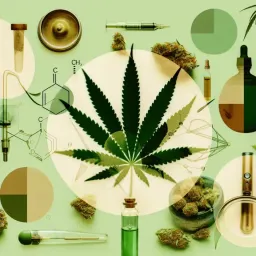Cannabis and Appetite Stimulation Effects
Understanding Cannabis and Its Impact on Appetite Stimulation
The Science Behind Cannabis and Appetite Regulation
How Cannabinoids Interact with the Body
Cannabis contains compounds called cannabinoids, which play a significant role in how our body functions. When consumed, these cannabinoids bind to receptors in the brain and other parts of the body, influencing various physiological responses. This interaction is particularly notable in regulating appetite, making cannabis a fascinating subject for those curious about its effects.
The Role of CB1 and CB2 Receptors
The human body has two main types of cannabinoid receptors: CB1 and CB2. CB1 receptors are primarily found in the brain and are crucial for appetite regulation. When cannabinoids like THC (tetrahydrocannabinol) activate these receptors, they can stimulate feelings of hunger, often leading to what many refer to as the "munchies."
Historical Context of Cannabis Use for Appetite Enhancement
Cannabis in Traditional Medicine
Throughout history, many cultures have recognized the appetite-stimulating properties of cannabis. In traditional medicine, it was often used to help people who had difficulty eating due to illness or other reasons. This historical use sheds light on how cannabis has been valued not just for its psychoactive effects but also for its ability to enhance appetite.
Modern Medical Applications for Appetite Stimulation
In recent years, the medical community has begun to explore the use of cannabis more seriously for appetite enhancement. Conditions like cancer and AIDS often lead to severe appetite loss, and cannabis has emerged as a potential remedy. By utilizing cannabis in a controlled manner, healthcare providers aim to help patients regain their appetite and improve their quality of life.
Pro Tip
Did you know? Using cannabis in combination with a meal can enhance its appetite-stimulating effects. This strategy allows the cannabinoids to interact more effectively with your body's receptors, potentially making eating a more pleasurable experience. Always consult with a healthcare professional to tailor the approach that best fits your needs!
Potential Benefits of Cannabis for Appetite Stimulation
Cannabis in Treating Appetite Loss Conditions
Appetite Stimulation in Cancer Patients
Cancer and its treatments often lead to appetite loss, making it difficult for patients to maintain their strength. Many studies suggest that cannabis can help in this area by stimulating hunger and easing nausea. For these individuals, consuming cannabis may lead to a significant improvement in their overall well-being and nourishment.
By engaging the body’s endocannabinoid system, cannabis can enhance the desire to eat, making meals more enjoyable. This can be especially beneficial for patients undergoing chemotherapy, which can dull taste and reduce appetite. As a result, incorporating cannabis into their treatment plan might provide a much-needed boost to their eating habits!
Benefits for Individuals with Eating Disorders
Eating disorders can severely affect an individual’s ability to consume food regularly. Cannabis may offer a potential solution by helping to normalize appetite and reduce anxiety around eating. For those struggling with conditions like anorexia or bulimia, using cannabis can ease some of the psychological barriers that prevent them from eating.
Research has shown that the hunger-inducing effects of cannabis can help patients experience a more positive relationship with food. Integrating cannabis into treatment could lead to healthier eating patterns and assist in recovery from eating disorders. It’s important to approach this method thoughtfully and under professional supervision.
Considerations for Safe Use of Cannabis for Appetite Enhancement
Balancing Risks and Benefits
While cannabis can be helpful for appetite stimulation, it’s essential to consider the potential risks involved. Each person responds to cannabis differently, so what works for one individual may not be effective for another. This is why consulting a healthcare provider is crucial before starting any cannabis regimen.
Our blog post on Learn the secrets of cannabis prescription alternative is a must-read for anyone interested in the subject. It’s filled with comprehensive details and thoughtful perspectives.
Additionally, being aware of the legal implications and health regulations surrounding cannabis use in your area is vital. We need to balance the benefits of appetite stimulation against the possible side effects, such as increased anxiety or altered mental states. Responsible use is key to ensuring a safe and positive experience!
Recommended Dosage and Consumption Methods
Deciding on the right dosage and method of consumption can significantly impact the effectiveness of cannabis for appetite stimulation. Many people start with a low dosage and gradually increase it until they find what works best for them. Common methods of consumption include smoking, vaping, edibles, and oils — each offering different onset times and effects.
Dive into our article on Understand cannabis strains new users for a complete overview. We cover all the essential points and provide a lot of useful information.
When considering edibles, it’s especially important to be cautious, as these often take longer to produce effects. Keeping a journal to track how each method affects appetite can help identify the best approach. Remember, everyone’s body is different, so patience and awareness of your own reactions to cannabis are essential!
Recap of Key Points
Here is a quick recap of the important points discussed in the article:
- Cannabinoids interact with the body by binding to receptors, influencing appetite regulation.
- CB1 receptors in the brain are primarily responsible for stimulating hunger, often leading to the "munchies."
- Historically, cannabis has been used in traditional medicine to help individuals with appetite loss due to illness.
- Modern medical applications of cannabis focus on aiding patients with severe appetite loss from conditions like cancer and AIDS.
- Cannabis may help normalize appetite and reduce anxiety for individuals with eating disorders.
- Consulting a healthcare provider is essential for safe cannabis use, considering both benefits and potential risks.
Practical Tips for Using Cannabis to Enhance Appetite
- Start with a low dosage and gradually increase to find the optimal amount for appetite stimulation.
- Keep a journal to track different consumption methods (smoking, vaping, edibles, oils) and their effects on appetite.
- Be aware of the legal and health regulations regarding cannabis use in your area.
- Consult with a healthcare provider before starting any cannabis regimen, especially if you have pre-existing conditions.
- Use cannabis responsibly to balance benefits against possible side effects like increased anxiety or altered mental states.
FAQs
What are cannabinoids?
Cannabinoids are compounds found in cannabis that interact with the body's receptors to influence various physiological responses, including appetite regulation.
Explore our extensive write-up on Everything you need to know about cannabis ptsd relief and discover all the nuances and important details. It's an engaging read filled with useful knowledge.
How do cannabinoids affect appetite?
Cannabinoids, particularly THC, bind to CB1 receptors in the brain, stimulating feelings of hunger and potentially leading to increased food intake.
What is the endocannabinoid system?
The endocannabinoid system is a complex network of receptors and compounds in the body that helps regulate various functions, including appetite, mood, and pain sensation.
Can cannabis help cancer patients with appetite loss?
Yes, studies suggest that cannabis can stimulate hunger and alleviate nausea in cancer patients, helping them maintain their strength and overall well-being.
Is cannabis safe for individuals with eating disorders?
Cannabis may help normalize appetite and reduce anxiety related to eating, but it should be used thoughtfully and under professional supervision.
What should I consider before using cannabis for appetite stimulation?
Consult a healthcare provider, consider legal implications, and be aware of potential side effects, such as increased anxiety or altered mental states.
Latest Posts
Consumption
Consumption






